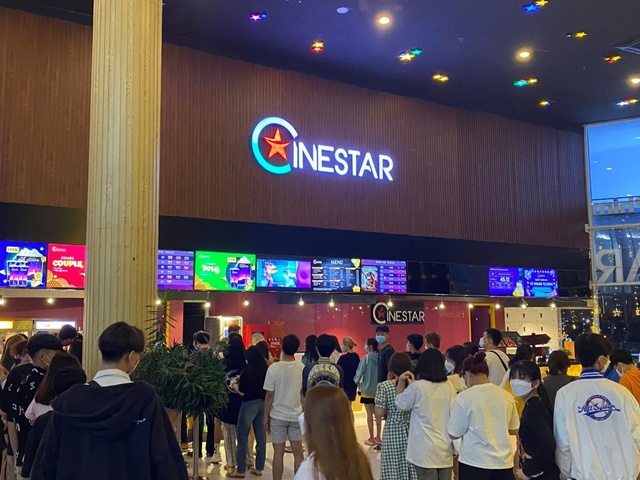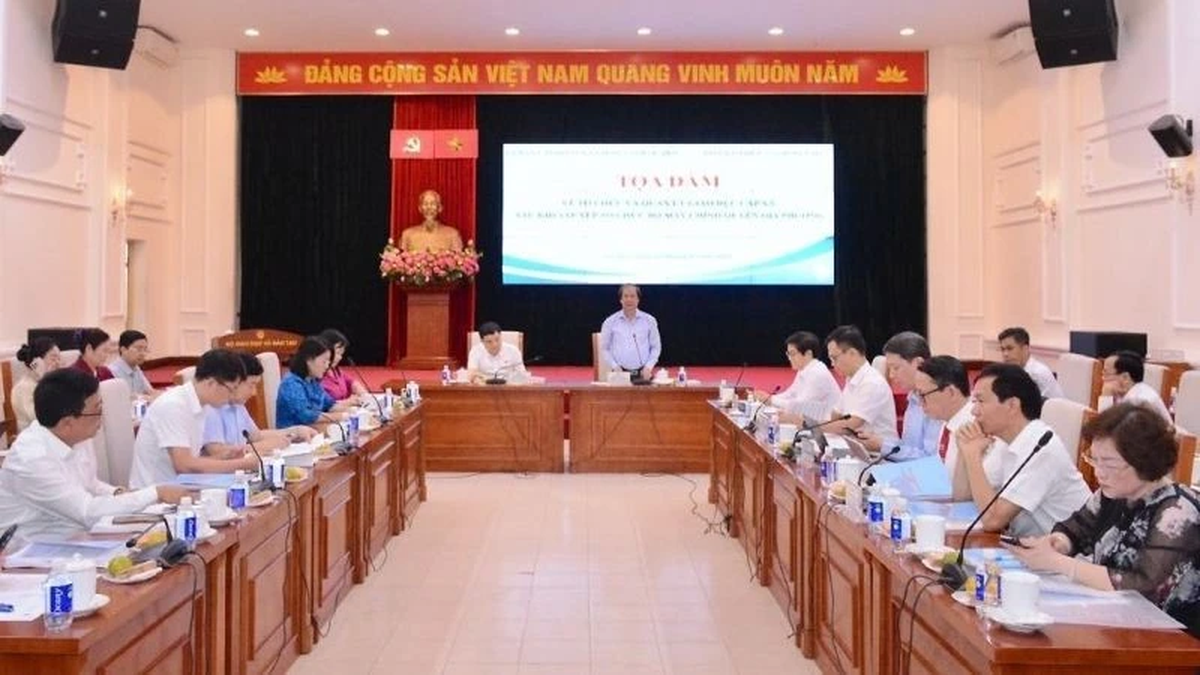(To Quoc) - Sharing with us, Ms. Truong Uyen Ly, as an independent observer in the field of creative culture, believes that increasing VAT on cultural products will hinder the process of cultural development and reduce people's rights and access to these products.
The draft Law on Value Added Tax (amended) (VAT) is expected to be approved by the National Assembly on November 26, 2024. It is noteworthy that this draft Law on VAT has removed the regulation that goods and services of cultural activities, exhibitions, physical education, sports , performing arts, film production, import, film distribution and film screening are entitled to a value added tax rate of 5%, increasing it to 10%.
Sharing with us, Ms. Truong Uyen Ly, as an independent observer in the field of creative culture, believes that increasing VAT on cultural products will hinder cultural development and reduce people's rights and access to these products.

Increasing VAT on cultural products will hinder cultural development and reduce people's rights and access to these products (illustrative photo)
+ Madam, the draft Law on Value Added Tax (amended) being submitted to the National Assembly this time stipulates that the tax rate for goods and services of cultural activities, exhibitions, physical education, sports, performing arts, film production, import, film distribution and screening will increase from 5% to 10%. In your opinion, is it reasonable to increase tax on cultural and sports products at this time?
- In my opinion, this is not the right time to increase value added tax for the cultural sector to the same level as other sectors, for the following reasons:
Firstly, does the current VAT increase contradict important documents that show the priority orientation for developing cultural industries issued by the Party and Government ?
Resolution 33-NQ/TW of the Party in 2014 clearly stated the task of Innovation, perfecting institutions, creating a favorable legal environment for building and developing the cultural market and cultural industry, while the Strategy for Development of Vietnam's Cultural Industries to 2020, with a vision to 2030 (approved by the Government in 2016, 1755/QD-TTg) pointed out the task of "Building, supplementing and perfecting mechanisms and policies for developing cultural industries in the new period...; preferential policies on capital, tax, land".
Tax exemption and reduction is a practical tool to demonstrate the development priorities of the Party and the Government. Up to now, the policy mechanisms for culture are not strong and sharp enough to create a real lever. Therefore, increasing VAT at this time does not demonstrate the task of "creating a favorable legal environment" of Resolution 33, nor does it demonstrate the goal of creating "preferential policies on capital, tax, land" of the Cultural Industry Development Strategy.
Second, more time is needed to test, observe and support the guiding documents to be "put into practice" by removing obstacles, instead of increasing VAT. It has been ten years since Resolution 33, eight years since the Cultural Industry Development Strategy, however, the above documents are only stopping at creating a change in awareness, and more time is needed to create leverage to promote the cultural industry from practical policy mechanisms.
Third, another reason why there is no need to increase VAT for culture is that the target of state budget revenue from the cultural sector is not high. With the view that developing the cultural industry is sustainable development, I believe that achieving high budget revenue from culture is not a priority of the State. Therefore, it is not necessary to increase VAT for culture at this time.
Fourth, in the long term, following the general development trend, cultural industries will gradually account for a higher proportion of GDP, contribute more to the economy, and help increase budget revenue. Increasing VAT on some cultural activities and services is understandable. However, this is the time when cultural industries need maximum support, a stable and flexible legal environment, to achieve real transformation, and have a stronger position in the face of global pressure and domestic socio-economic fluctuations.
Fifth, I think that considering delaying the VAT increase at this time will help us gain valuable input data from development practices, for example from observing the implementation process of the Capital Law 2024. This Law has breakthrough provisions that, if implemented, will help strongly promote the cultural industry for Hanoi, such as Article 43: Investment incentives; Article 41: Management, use of public assets and exploitation of infrastructure works; Article 39: Implementation of investment projects under the public-private partnership method; Article 25: Controlled testing; Article 21: Development of culture, sports, tourism, section 8: Hanoi City is allowed to establish a commercial and cultural development zone.
The implementation of the Capital Law will help us observe the actual development and thereby help to concretize the contents of the VAT Law more clearly, more fairly, more realistically, with more appropriate tax rates for each category of cultural activities and goods, avoiding the "leveling" of 10% for many different goods and service activities as is currently the case.
Sixth, in fact, although the VAT obligation belongs to the customer, the taxpayer is the seller. Therefore, in essence, VAT directly affects the product price and the competitiveness of cultural goods and services compared to other goods and services, thereby also affecting the seller (enterprises, organizations, individuals doing business providing goods and services). In the context of the global economy shifting to sustainable solutions in which the creative cultural industry plays an extremely important role, it is necessary to encourage the use/consumption of cultural goods and services. Increasing VAT will partly reduce the demand for consumption of cultural content and values of customers and affect individuals and business organizations.

Independent observer Truong Uyen Ly
+ With many years as an independent observer, can you tell us how countries with developed cultural industries collect taxes on cultural products?
- Speaking of VAT, in Europe, their average rate is 19-25%, but in the cultural, publishing, exhibition and performance industries, it is always much lower, only 7-8%, while in developed countries, it is 11-12% compared to the average rate. That is, even in developed countries, they only tax cultural products at 1/3 of the VAT rate applied to other industries.
Countries with developed cultural industries always support and invest in culture. Culture is always prioritized and in many countries, the State invests in culture, supports cultural business activities very specifically. For example, infrastructure, if in a city or town, when a business invests in a theater or an exhibition hall, it will be supported with initial investment money, the State will invest money with the investor or let the investor use it for 5-10 years and at the same time reduce taxes. If it is used for a period of time, then they will test whether the investment is effective or not and if it is effective, they will invite the investor to replicate the model, whether replicating or keeping the model, the State will always and certainly support.
Do not increase VAT, keep VAT rate reasonable, enterprises investing in culture are exempted from corporate income tax, supported to rent premises or support technical facilities in the first years, in the following years corporate income tax for cultural enterprises must also be different from other industries.
Tax reductions are always included in cultural support policies in countries. At the same time, in many countries, philanthropists, corporations, large and small companies or individuals who donate money to cultural and artistic funds will receive tax reductions. This does not exist in our country and invisibly discourages businesses and individuals from investing in culture. Even if they love culture and invest in culture, they are not recognized or have their taxes reduced, and that is the weakness of Vietnam's cultural policy.
So clearly there is a basis for us to connect and learn, but how can we create a clear understanding, how can policy makers understand and create a more transparent foundation, expressed in legal documents?
+ Many people believe that increasing VAT on cultural products at this time will hinder the development of culture. What is your opinion on this issue?
- VAT is a powerful tool that affects all aspects of the cultural sector. The Party and Government's policy is to prioritize the development of culture and cultural industries, but while there is no mechanism or policy for culture, VAT has increased from 5% to 10%, which is equal to other goods. Does this go against the policies and orientations of the Party and Government? That is a big reason to reconsider increasing taxes on cultural products.
Not to mention each business, individual, and organization is affected every day, every invoice issued, every opportunity is affected. Consumers - the people, will not be willing to spend money on cultural products anymore. Because consumers will have to pay a higher price for cultural goods that they deserve. Culture is a special commodity, the core value of culture is to create the ability for everyone to have wide access, enjoy together, make spiritual life more advanced and improved. Increasing prices will reduce the ability to access that people should have wider access to.

Culture is a special commodity, the core value of culture is to create the ability for everyone to have wide access, enjoy together, and make spiritual life more elevated and improved (illustrative photo)
+ According to you, what should be done to have policies to support cultural development in the current period?
- In my opinion, the more practical action at this time is to wait until we increase VAT, but first look at the "bottlenecks", point out the very specific problems to find ways to solve them.
I think that the National Assembly delegates should not press the button to pass the Draft Law on VAT, but wait a little longer, to have more data, more dialogue, more observations, more policy mechanisms to promote the further development of the cultural industry, then amend the Law (specifically increase or decrease in some areas), to make it more realistic and fair. Then there is the "communication" of the Law, so that it is "communicated" from top to bottom, to each local tax official, so that the Law can "enter life" and have a real impact!
We have the resources to develop, and the love of businesses and individuals who are passionate about pursuing culture. We just lack the policy mechanism to facilitate it, so that businesses, managers and people can "touch each other" and be circulated so that resources become potential and are developed accordingly.
Dialogue with managers and lawmakers is needed. Managers need to dialogue on how to make administrative procedures easier for all parties. In terms of law, tax exemptions and reductions are clear, direct and specific tools for all parties to see that everyone enjoys equal rights and obligations before the law and that everyone can access and practice the law in a transparent manner.
+ Thank you very much!
Source: https://toquoc.vn/tang-thue-vat-doi-voi-san-pham-van-hoa-lam-giam-kha-nang-va-quyen-tiep-can-van-hoa-cua-nguoi-dan-20241101095155804.htm



































































































Comment (0)